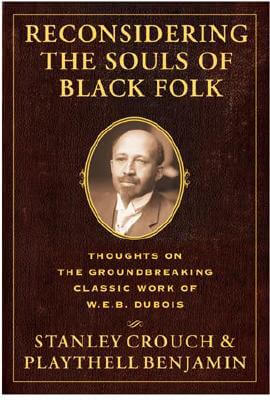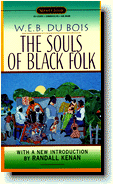Book Review: Reconsidering The Souls Of Black Folk: Thoughts On The Groundbreaking Classic Work Of W.e.b. Dubois
Reviewed by:
ThumperTo commemorate the 100th anniversary of The Souls of Black Folk by W. E. B. Du Bois — of one of the most significant books ever published in American letters — authors Stanley Crouch and Playthell Benjamin have written a book of essays titled Reconsidering The Souls of Black Folk.
The Souls of Black Folk is one of the most controversial books in print, and has been since its first printing. The Souls of Black Folk is Du Bois’s effort to show the humanity of black people by appealing to the audience’s intellect through social science and plain ol’ common sense. A few of the primary reasons The Souls of Black Folk has stood the test of time is the beauty of its lyrical, graceful prose, and the fact that Du Bois’s assessments were numerous, truthful, and attainable. He had the gift of a seer, the tongue of a poet, and unblinking observations, all of which came together to create a literary masterpiece. Many consider The Souls of Black Folk to be America’s greatest contribution to the literary world.
I cannot recall another book that has withstood so much critical analysis, through so many generations of readers than The Souls of Black Folk. It is only fitting that Souls receive a fresh look, and in many ways the magnificent Reconsidering The Souls of Black Folk accomplishes this task. While I had some problems with Reconsidering, the writing is exceptional, and I found it enjoyable.
Based on the title alone, I thought Reconsidering would consist of authors Benjamin and Crouch debating the points and issues that arose from The Souls of Black Folk. I was wrong. I should have learned long ago not to assume anything when it comes to books. Benjamin began the book with essays that functioned as a short biography of Du Bois. Crouch followed Benjamin’s lead with additional essays on Du Bois’ life. The essays were beautifully written, but I wondered why was I being carried through Du Bois’s biographical details? Surely, anyone interested in reading Reconsidering would already known a little about Du Bois and have already read The Souls of Black Folk, right? Otherwise, why would anyone, ignorant of both Du Bois and his signature work, want to read Reconsidering? Reconsidering is an easily digestible read, but far from what I would classify as a coffee table book. But, because of the remarkable writing, I gave the biographical essay a pass.
The second half of the book proved to be more entertaining and thought provoking than the first. Both authors discussed the two most controversial essays in The Souls of Black Folk: Of Booker T. Washington and Others; and Of the Training of Black Men, which contains Du Bois’ Talented Tenth theory, and alleged elitist views. I could not envision a book focused on Du Bois and/or The Souls of Black Folk without examining these issues. I was more than satisfied with Benjamin’s treatment of the three issues, and less so with Crouch’s responses.
|
First published in 1903, this extraordinary work not only recorded and explained history, it helped to alter its course. Written after Du Bois had earned his Ph.D. from Harvard and studied in Berlin, these 14 essays contain both the academic language of sociology and the rich lyrics of African spirituals, which Du Bois called "sorrow songs." New introduction by Randall Kenan. Major school adoption title. |
Call me contrary, if you like, but I was never taken Du Bois’ Talented Tenth theory. It dripped with elitism. For many years I had an imperceptive opinion of it until I read The Souls of Black Folk for the first time this year. (It is always best to go to the original source and not receive your knowledge second or third hand if you can help it.) After reading Of the Training of Black Men, my hostility concerning the theory diminished but I still didn’t swallow it whole. I believe the theory is faulty along these three lines: 1.) Basically that we, the other 90%, still need to be lead or done for, as if we were livestock incapable of forming an individual thought; 2.) That in receiving a liberal education, one will have the necessary tools and wherewithal to beat a path wide enough for others to follow, or that one would want another to follow him; 3.) Liberal education has enough practical application to be useful in the real world, and not exist solely in Du Bois’s head.
Playthell Benjamin’s outstanding defense of Du Bois and his Talented Tenth theory did cause me to rethink my position on Du Bois. I’m not saying that I changed my position. I examined it and decided to stay where I was, BUT Benjamin’s argument was tight! In response I would mention to Mr. Benjamin, that in order for the Talented Tenth to lead the masses, they have to be able to communicate with them — at the very least be in their line of vision.
In his second set of essays, Benjamin takes Cornell West and Henry Louis Gates to task concerning their scholarly interpretation of Du Bois, and his legacy. It’s all right with me if Cornell West, in Benjamin’s opinion, didn’t show Du Bois the proper amount of praise. Or, that Henry Louis Gates isn’t striving to be a second-generation replica of Du Bois. After all, it ain’t like Du Bois walked on water. But I was puzzled as to why Benjamin decided to use the forum of this book to express his feelings concerning these two men. Despite my confusion as to the motive behind Benjamin’s critique of West and Gates, I nonetheless loved it! Benjamin’s critique of West and Gates was forceful, in your face, sarcastic, logical, solidly supported and funny as Hell! Benjamin became my hero! How I wish I had the ability to tell somebody off in a nice way. *smile*
Reconsidering is primarily Playthell Benjamin’s book. He is the star of the show. Stanley Crouch was simply an intermission and ultimately, an afterthought. Crouch’s essays were short and didn’t appear to the have the same passion or put in the same amount of time and thought as Benjamin’s. While Crouch disagreed with a few of Benjamin’s points, on the whole, they saw eye to eye through most of the book. The book could have benefited with a few more "point-counterpoint’— type essays opposing the opinions of the other author.
After reading Benjamin’s essay, Some Parting Thoughts, I felt the book could have ended there. When I noticed that Crouch had a second set of essays, I said, "Oh, Stanley…you still here?" Crouch’s second set of essays was unnecessary. While the writing was good, I wasn’t that impressed by what he had to say. Crouch did manage to throw a little bit of mud on the near-blinding shine of martyrdom that Benjamin left on Du Bois after polishing and buffing it with the patience and conviction of a zealot. Only then did I become interested in Du Bois the man. So much so that I think I will have to tackle David Levering Lewis Pulitzer Award winning mammoth Du Bois biographies to see more of this brilliant and flawed man.
Reconsidering the Souls of Black Folk is really reconsidering W. E. B. Du Bois; his place in history, his accomplishments, and the place The Souls of Black Folk have in the canon of American literature. Through it all, I found Reconsidering The Souls of Black Folk to be worth considering, and I highly recommend it.



